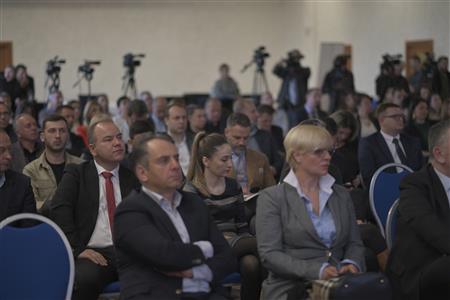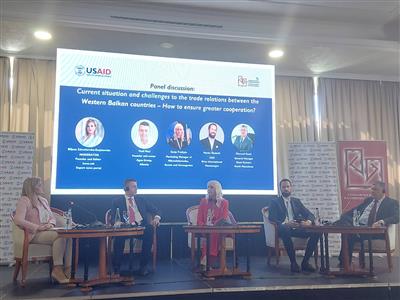At the beginning of the conference, H.E. Angela Price Aggeler, USA Ambassador to North Macedonia, Branko Azeski, President of the Economic Chamber of North Macedonia, and Fatmir Bytyqi, Deputy President of the Government in charge of Economic Affairs, Coordination of Economic Sectors, and Investments, addressed the attending representatives of the business communities from the regional countries, as well as the representatives of the WB6 chambers of commerce and the diplomatic corps.
The USA Ambassador to North Macedonia, Angela P. Aggeler pointed out, “The future is in your hands. You - the private sector - must contribute to resolving the biggest challenges that hinder investments, hinder innovation, and create economic instability. Demand rule of law, help in the fight against corruption, and lobby for better infrastructure and connection in the region.“
In his address, the President of the Economic Chamber of North Macedonia Branko Azeski focused on several issues. “History and politics continue to dominate our region relative to economy and business. Balkan political elites needed 30 years to understand that pursuing a regional policy and approach is not a return to former Yugoslavia, it is rather siding with the Western progressive values, and that a successful regional integration requires initiatives emerging from the very Western Balkan countries, following the successful example of the Visegrád Group. Not only we are small economies individually, but also we are small as a region even if we united in the Western Balkans. This means we should invest maximum efforts to improve all aspects of our performance relevant to increasing exports and to creating competitive products, which would have price and quality that can match the competition in other markets. If we fail to do so, we will bring the development of business into question.“

Fatmir Bytyqi, Deputy President of the Government in charge of Economic Affairs, Coordination of Economic Sectors, and Investments, said, „Regional cooperation ensures growth and development of the economies. The challenges are not an obstacle, they are instead a chance to jointly overcome them and jointly multiply the chances and opportunities opening ahead. Increasing economic integration and cooperation among Western Balkan countries though the existing initiatives is a priority of every nation in the region. This should be the Balkans of the 21st century. Regional competitiveness is key that unlocks the door of prosperity for the Western Balkans.”

During the conference, a panel discussion took place between firms from the Western Balkans, aiming at pointing out positive examples and good practices, as well as opportunities, problems, and challenges to promoting regional cooperation. Moreover, Prof. Dr. Darko Lazarov, head expert and President of the Exporters’ Club at the Chamber, presented his Study on the opportunities for stimulating higher level of regional cooperation, including opportunities for intensifying trade among Western Balkan countries. The expertly conducted analysis, developed for the requirements of the Chamber’s Private Sector Regional Integration Support Activity (PSRISA) implemented in partnership with USAID, is the first of its type in the region, which analyzes the current situation in a different manner, by extensively examining data on individual products and markets, and more importantly, maps the untapped intraregional trade potentials.
With the Private Sector Regional Integration Support Activity (PSRISA), USAID is supporting the Economic Chamber of North Macedonia in the efforts to ensure greater integration of businesses into the regional and global value chains and increase their capacity to be competitive in the Western Balkans and beyond, in the EU. The idea is to create public-private dialogue tools, promote the benefits from regional economic integration to the business community, study and promote export opportunities, and provide sustainable services for exporting companies.
.png)
